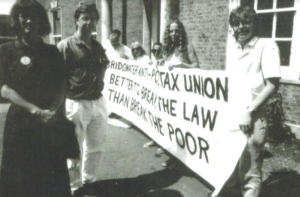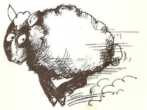 Bridgwater’s most successful attempt to date at collectivising punk anarchy and overthrowing the Dark forces of Reaction that held progress in check in the town–started off as a fanzine for punk band The Dangerous Brothers.
Bridgwater’s most successful attempt to date at collectivising punk anarchy and overthrowing the Dark forces of Reaction that held progress in check in the town–started off as a fanzine for punk band The Dangerous Brothers.

On September 7 1977 the first edition of Sheep Worrying Magazine was brought out as a promotional tool for the DB’s social scene. At every subsequent gig a new edition came out. Irreverent and anarchic it was put together by Brian Smedley as editor, Rod Jones-as overall visionary and with art work from Dave Newton plus consistent articles from Kim Newman & Eugene Byrne it was eagerly snapped up.
In 1978 the Dangerous Brothers were at the forefront of the Bridgwater punk scene playing regular gigs at the art centre and building up a following often too big for the building. That same year they moved to Leeds. And back again.
By 1979 the DBs reformed and picked up where they left off with their ‘Hamburg’ experience under their belt. Gigs picked up at the art centre and as the Tories took control across the country they were coming into direct confrontation with the powerful elite that (thought they) ran the town.
In 1980 Jones and Smedley devised the concept of ‘Sheep Worrying Enterprises’ which was conceived of initially just to promote the Dangerous Brothers but after several brainstorming sessions its potential value as a force within the community to make things happen and organise creative people in a supportive environment became clear.
A Record Label
In April the Dangerous Brothers single ‘False Nose/County Councillor’ was released on the Sheep Worrying label. Sheep Worrying-now distributed by Rough Trade, became recognised as an indie label around the world through the underground ‘alternative’ network.

‘False Nose’/ ‘County Councillor’ was written by Brian Smedley and recorded at the White Hart Pub, Bridgwater. It was mixed by Brian Comer of Triple M studios.The band line up was Rod Jones (vocals) Brian Smedley (bass) Neal Heckford (keyboards) Kevin Freeman (drums) Simon Gibb (guitar). During the production phase Jones left the band and local sax player Tonto redid the vocal for False Nose, although the band left Jones’ vocal on County Councillor.
Sheep Worrying also released albums and singles by Club Whoopee, The Sedgemorons and Red Smed and the Hot Trot Smash the System Boogie Band.
A Theatre Group

In the summer of 80 the Bridgwater Youth Theatre had been disbanded in the first wave of Tory cutbacks. Many of its members were part of the DB’s scene. Brian Smedley and Kim Newman co-operated on a stage musical-written by Newman with songs by Smedley and based on ideas from within the group and then formed their own theatre company ‘Sheep Worrying Theatre’ featuring members of the defunct youth theatre to put on the show ‘Another England’ about a Nazi take-over of the country which was performed at the Art Centre in September 1980.
The play was so popular that the group immediately produced another play ”The Scandalous History of the Reverend Henry Prince and his abode of love’-written by Charlie Mander and featuring Newman in the lead role. The play was a key choice as it had been banned by the Bridgwater College Principal JC Miles, when the Youth Theatre had attempted to do it. The show was a sell out And the idea nicked by Charisma films for its movie ‘The Missionary’.
A Rock Movement
In August 1980 Smedley co-ordinated contacts from bands all around Somerset to produce a less DB’s orientated Sheep Worrying Magazine and upped circulation to 500 and then to 1,000 now using the fanzine as a focus for bands all over the county thereby filling a glaring gap in the local music scene. By 1981 the magazine was coming out monthly and circulating from Bristol to Exeter-being featured on the BBC West TV programme ‘RPM’ , demonstrating that things were happening outside of the cities.

In September 1980 Smedley got the Arts Centre temporary manager John Ridley, to agree to letting Sheep Worrying run the Arts Centre’s rock music programme-building on the work done by former manager-Bob Ormrod in developing the Arts Centre as a rock venue. The Sheep Worrying Music group stipulated that only local bands playing their own music should get the gigs. It was this radical step adhered to in the face of stiff opposition that kept the place accessible to local bands, inspired groups to form and reform and maintained an average of 4 original local bands a month playing the Bridgwater Arts Centre therey creating a local music scene and giving it a home.
1980 had been a pivotal year for Sheep Worrying. But 1981 saw them expand across the region with a mass circulation magazine, control of the art centres rock programme and a TV appearance under their belt.

In 1982 the Empire struck back and compromises were made as the organisation repositioned itself. Pressure to include name or semi-name bands led to a temporary split and subsequent compromise . Thereafter many up and coming names from the Indie scene played the Arts Centre under the Sheep Worrying banner.
During this time Sheep Worrying brought out 3 cassette compilations of local bands ‘Tubular Sheep’, ‘Dark Side of the Sheep ‘ and ‘Magical Mystery Sheep‘ and also ran an ‘Alternative Film Club’ and 2 ‘Festivals of Alternatives’ including an outdoor football & rock festival at the YMCA.
Sheep Worrying Theatre Group managed to perform at least 3 plays a year by local writers as well as staples Newman and Mander.
In 1983 the group moved into Unity House and established itself with a base -indeed an ‘office’. Thatcherism was biting and the group was becoming more political, more socialist and more controversial. But they stuck to their guns and kept up the output.
By 1984 Sheep Worriers were making names for themselves. Stuart Croskell won the Somerset original Playwriting award with his play ‘Harry’ and the following year it was Dave Butland with ‘Real Fiction’. Automatic Dlamini were on RPM and the Magazine joined up with other alternative papers across the country at networking conferences in Leeds and Brighton. The Miners went on strike and Sheep Worrying members publically supported them.
The Thatcherite Backlash

In 1985 the Miners had been defeated and things looked grim. Bridgwater, in as many other working class communites, was suffering major levels of unemployment. Sheep Worrying members had been working alongside activists and now faced a backlash from the angry ‘powers that be’. Articles in Sheep Worrying Magazine satirising Police violence and caricaturing local Tories , led to the District Council withdrawing Sheep Worryings Grant. Trouble at gigs caused by National Front skinheads from out of town led to increasingly tough conditions imposed on the events by the Art Centre Board of Management. Smedley was described by senior Tories as ‘The most Dangerous Man in Somerset’. In fact he probably wasn’t.
Socialist History on Stage

In 1986 Sheep Worrying stood its ground. A series of Bridgwater ‘Socialist History Plays’ written by Smedley from 86 to 88 supported by best selling booklets followed from the 1985 ‘community play’ The Kings Justice by Charles Mander which was test run by Sheep Worrying. Brickyard Strike, The Siege of Bridgwater and The Vernon Bartlett Show were followed in 1989 by ‘Jack and the Poll Tax’ a satire on the big issue of the day.
These were the darkest of days of Thatcherite Britain. The miners had been defeated, the printers had struck and been defeated , Ulster Unionists and fascists had brought violence to the streets of Bridgwater. Sheep Worrying soldiered on and shone a (admitedly very small) light in the darkness.
1987 things only got worse as the Tories won yet another general election. The Labour party locally was hit by splits as right wingers formed a seperate party ‘Traditional Labour’ , and both fought each other into the ground reducing Labour representation to its lowest ever locally. Sheep Worrying members stood for council for the first time and Glen Burrows got elected in Eastover.
1988 the tide was slowly, slowly turning. The Tories were so confident in their power that they would bring in a massively unpopular poll tax to final crush working class resistance. But people weren’t taking it any more and were organising against it and it would be a bloody fight. Sheep Worrying was engaged in its own major battle with the Tory dinosaurs who held the art centre board to ransom and in an open confrontation even picketed the place. The last great battles of the 1980s were looming.
By 1989 shit hit fans everywhere. Dictatorial communist regimes across East Europe collapsed and in Britain the people rose up against Thatcher. Another Sheep Worrier, Pat Morley, wins a Labour seat on County. Left-right battles in the Labour party are being fought and won and lost and fought again. Sheep Worrying put on a ‘Poll Tax Pantomime’ at the Art Centre and the year end looks like triumph in the face of adversity.

In 1990 Sheep Worrying was beset by internal division and lost control of the Art Centre’s rock programme to a small group of Management chosen individuals who shortly after left the area but had succeeded in transferring the rock programme back into the hands of the Art Centre Committee. Similar restrictions by the Art Centre on withdrawal of subsidy from Sheep Worrying Theatre in the same climate led to a campaign of picketing of the Centre by a dwindling group of activists. The last show ‘The Bad New Days’-a music hall satire, was in December 1990. But the battlefield had shifted, In July 1990 Sheep Worrying founder Brian Smedley was elected as a Labour Party-Anti-Poll Tax Union candidate to Sedgemoor District Council and the mighty trembled. And probably half of the Labour Party too……
By 1991 Sheep Worrying had, in that rather anarchic fashion, simply disappeared into the night leaving roots, seeds and ideas everywhere. And now the project would go intenational….
Sheep Worrying Magazine reached issue 52 before folding. And being stapled.
How to use this web site. Go here.

 Bridgwater’s most successful attempt to date at collectivising punk anarchy and overthrowing the Dark forces of Reaction that held progress in check in the town–started off as a fanzine for punk band The Dangerous Brothers.
Bridgwater’s most successful attempt to date at collectivising punk anarchy and overthrowing the Dark forces of Reaction that held progress in check in the town–started off as a fanzine for punk band The Dangerous Brothers.